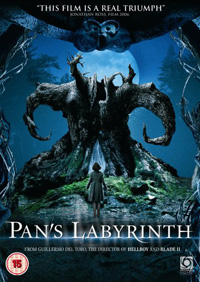 Pan’s Labyrinth is a visually stunning film. The extraordinary imaginations of director del Toro and cinematographer Navarro have created a truly spectacular fantasy land full of images that will live with the viewer long after they have left the cinema. But there is far more on offer here than eye candy. As well as being beautiful, Pan’s Labyrinth is also a powerful, moving and intelligent film.
Pan’s Labyrinth is a visually stunning film. The extraordinary imaginations of director del Toro and cinematographer Navarro have created a truly spectacular fantasy land full of images that will live with the viewer long after they have left the cinema. But there is far more on offer here than eye candy. As well as being beautiful, Pan’s Labyrinth is also a powerful, moving and intelligent film.
It is also a profoundly sad story. It is a story in which the real world is filled with brutal violence, blood flows and cruel death comes even to the innocent. The only escape is found in a darkly fantastical world, which itself is full of gruesome ordeals and dreadful terrors.
Like Terry Gilliam’s Tideland, Pan’s Labyrinth takes Alice in Wonderland’s premise of a little girl escaping into a fantastical realm and places it against a more troubling domestic background and then it twists the magical world into something quite horrific.
Pan’s Labyrinth is set Spain in 1944. The Spanish Civil War is all but over. The great battles have been won and the fascists are mopping up the remnants of the republican forces in a bitter but small-scale guerrilla war. Against this background Carmen (Gil) brings her daughter Ofelia (Baquero) to a rural army outpost in northern Spain to live with her new husband Captain Vidal (Lopez). Vidal is a martinet, a vicious thug in a uniform who expects automatic obedience from everyone – especially his wife and step-daughter. His only real concern for his new family is with the welfare of the son he believes his new wife to be carrying.
Ofelia befriends Mercedes (Verdu), the Captain’s housekeeper who is secretly supplying the republican guerrillas with aid and information, and through her the little girl finds an ancient labyrinth that is the gateway to a fantastical world. Here she meets a faun who tells her she is really the princess of a magical kingdom and gives her three tasks, promising her that if she completes them she will be returned to her rightful place alongside her true parents as ruler of this mysterious land.
The quest takes young Ofelia into a dark underworld inhabited by huge bugs and a giant, malodorous toad and then into battle with a nightmarish monster with eyes in its palms before, finally, she must decide whether to sacrifice another for the sake of her own happiness. These fantasy sequences are magnificently realised and full of vivid imagery but they are given their real power by the performance of young Baquero who mixes an innocent vulnerability with surprising steel to bring the fantasy world to life.
But what is most remarkable about Pan’s Labyrinth is the ending, which can be taken at face value as a victory – albeit bittersweet – as the evil captain is vanquished and Ofelia receives her promised reward. However, beneath the apparently happy ending, is the nagging sense that what we’ve actually witnessed is a terrible tragedy.
The viewer knows, for example, that in the real world the republicans scored no significant victory in 1944 and that this period was merely the beginning of more than thirty years of fascist dictatorship and bitter struggle. Even today Spain has not completely come to terms with this period in its too recent past.
From that knowledge comes the harrowing certainty that Ofelia’s fantasy world was nothing more than a daydream and that her apparent escape at the end of the film is simply the flickering imagination of a child steeped in tales of fairies and princesses. If that’s how we are meant to understand the film – and it is how I read the ending – then del Toro has presented the audience with the bitterest of fairytales where fantasy represents the slightest sliver of consolation in a violent, bloody and painful world.
But even if one is allowed the comfort of a more optimistic reading of Pan’s Labyrinth it remains a sad and sometimes painfully moving film. This is a horror-fantasy that doesn’t rely just on shocks or cheap frights but builds drama and an almost unbearable tension out of our genuine affection for its cast of characters and our willingness to be utterly transported into their worlds, both real and fantastic.
Pan’s Labyrinth is a triumph, del Toro’s best film to date, one of the very best films of the year in any genre and it will certainly rank amongst the best horror films made in the last decade or more. The core performances are outstanding, the imagery overwhelmingly powerful and the story is complex and layered enough to keep fans and academics rubbing their chins for years and years.
This is a rare film that can be unequivocally recommended.